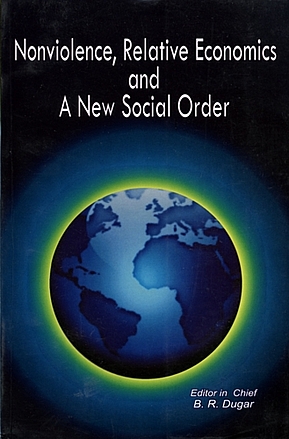The two words - "violence" and "possessiveness" seemingly connote two different meanings, but their ultimate significance revolves round the same axis. For, "possessiveness" plays a vital role in giving birth to "violence".
Similarly, "non-violence" and "non-possessiveness" may appear to have different verbal meanings, but essentially both are concomitant, the non-possessiveness being the cause and the nonviolence its outcome.
In Lord Mahavira's philosophy, both violence and possessiveness have been stated to act as an impediment to the development of soul or consciousness.
Today however the index of development is related with the economic development only. The modem (present-day) economics too is centered more around the prosperity of an individual rather than that of the society. The result is that only a section of society is getting richer while another section is reeling under the pangs of hunger and stark poverty.
The principle that 'the minimum basic needs of the entire society should be fulfilled first' can serve as a great fundamental principle of economic system. It means that everyone would be able to get food, clothes, shelter, medicine and education. Let us not bother about other economic equity. Let us accept that all individuals have their own way of earning and own professional skill. Some would earn more, some less. We cannot have mechanisation of economic equity. It is difficult to conceive that all become millionaire. The only possibility is - everyone would at least have his basic and primary needs got fulfilled. If individuals' earnings are unequal due to difference in their individual dexterity, others should not have objection to it. Both Ruskin and Gandhi held that both the judge and lawyer should get the same remuneration. It implies that one should definitely get at least that much through which one can fulfill the needs of life. But this condition cannot be fulfilled in absence of self-restraint over one's accumulation and consumption.
The problem that prevails is due to the fact that more emphasis is given on economic development, that is, on more and more production, more and more income and distribution, but it lacks two important things - restraints over accumulation and restraint over desires. The result is that the economic problem remains unresolved.
This fact can be put in another way: the socio-economic system sans 'righteousness (dharma)' would jeoparadise. If the latter would have been assimilated in the former, the modern economics would have added the element of restraint with the economic development and consequently, a new equation would have been created. If restraint over desires and restraint over consumption had been a part and parcel of economic development, then there would not have been created such a great disparity between the poor and rich, there would have existed a scope for the society to think in new terms and the problem of money and possession would not have become so dreadful as it is today. When we have a glance at the big metropolitan cities of India, we find there a long row of sky-scrappers on one side and even larger area of slums on the other and this pathetic view would fill our hearts with strong repugnance.
So long as man catches hold of the ownership of possessions, greediness would continue to raise its ugly head, and violence cannot be terminated. It means that the root is not violence, but it is the possessiveness. In the Acharanga Sutra (a sacred scripture of Jains), the root causes of violence are mainly considered to be greediness, possessiveness and desire to acquire power. Once the Director of Zoo at Munich (Germany) said that when the monkeys are brought to the Zoo from the forest, they don't like to stay in the cages, but once the monkey establishes its right over its own cage, then it would not allow any other monkey to enter into its own cage. This is the instinct of possessiveness or ownership. Unless it is given up, the objects become the cause of attachment or infatuation.
At the advent of the 21st century, the SAARC conference had made a resolve" We shall eradicate poverty totally within seven years". But such resolve by any government cannot become successful without the cooperation of the people. It is unfortunate that people's cooperation is not sought for to realize the governmental resolve. Hence, the dreams remain unrealized. We should pay more attention to the truth whether our consciousness is involved in our activity or not. The secret of success of Mahatma Gandhi lies in the fact that he stuck his consciousness to the spinning wheel (Charkha) and the broom, and hence the spinning wheel became his sudarshan-wheel and the broom became his unfailing weapon. The broom and the Charakha cannot become powerful without being related with consciousness. We failed to make India the country of Gandhi's dream, because the consciousness of people could not be involved.
Principles of relative economic system:
- Violence and parigraha are intimately interconnected. The policy of economic development in modern economics is not ahimsa sapeksha, that is, it is not non-violence oriented. Hence, wealth is becoming instrumental in perpetuating violence. Modern economics is more about violent activities than fulfilling basic human needs.
- Economic development is neither non-violence oriented nor ethics-oriented. Hence, honest and deceptive practices are on the increase in business and industry.
- Economic development is not ahimsa sapeksha, hence greed for wealth and corruption is increasing.
- Economic development is not ahimsa sapeksha, hence needs of large industries and businesses are advocated and needs of small scale and cottage industries are often ignored. The widening gap between the rich and the poor is thus imminent.
- Economic development is not ahimsa sapeksha, hence rampant mechanization is leading to galloping unemploy-ment and hunger.
- Economic development is not ahimsa sapeksha, hence our view of wealth is a perverted one. Wealth is no longer a means to fulfil the needs, but has become an end in itself.
- Economic development is not ahimsa sapeksha, hence we have a deluded view of accumulation of wealth. The inevitability, and utility and necessity of material comforts have become the rationale behind accumulation.
- Economic development is not ahimsa sapeksha, hence the policy of investment is full of flaws.."
- Economic development is not ahimsa sapeksha, hence limitless consumption of wealth is causing limitless reactionary violence.
- Economic development is not ahimsa sapeksha, hence industrial development is instigating individualism at the expense of society.
- Economic development is not ahimsa sapeksha, hence individual selfishness and hedonistic mentality is escalating.
- Economic development is not ahimsa sapeksha, hence the stream of compassion is drying up and cruelty and exploitation have raised their ugly head.
- Economic development is not ahimsa sapeksha, hence the vital problem of alleviating hunger is relegated in the background.
Fundamentals of Relative Economics
- That activity cannot attain success, which is devoid of the process of transformation of consciousness.
- The system for controlling possessiveness or individual ownership cannot attain success because it lacks in the technique of transformation of consciousness.
- The mission of non-violence can become successful only when it is infused with consciousness of spirituality or consciousness of emotion.
- If only intellectual consciousness is developed and if only economic development takes place, then bread cannot go together with non-violence and peace.
- If mere consciousness of spirituality is developed, then both Ahimsa and bread cannot go together.
- Ahimsa, peace and bread can go together only when intellectual consciousness, economic consciousness and spiritual consciousness are developed in a balanced manner.
- Stopping the reactive violence is possible only when the disease of consumerism that grows with the economic development is treated and consciousness of self-restraint reaches the higher level.
- The solution to this problem is Training in Non-violence; mere intellectual deliberation would not be enough to provide the solution.
Means to develop the relative economics:
- Conciliation between human labour and machine. This would address the issue of unemployment and exploitation of human labour. Value of human labour and also the work done by human labour should be increased in proportion to its needs.. The appropriate value of human labour plays a dominant role in forming a society bereft of exploitation.
- Importance of investing in community-oriented priorities. There should be investment in production of commodities which are necessities and not luxuries.
- Conciliation between the present and the future, which is, striking a balance between the available resources to be used by present generation and those to be used by the future generation. This makes the preservation of environment inevitable. Natural resources should not be exploited to such an extent that the generations to follow are confronted with the problems of their scarcity.
- Nurturing of a decentralized economy, that is, exercising restraint over human propensity for centralization, exhibitionism and devastation.
- In 1931, an eminent economist predicted that "capitalism would be competent enough to fulfill the basic human needs in the span of 100 years. Let us put aside the question of morality and immorality till then". But today 75 years have already elapsed and the main problems of hunger, disparity and unemployment are still rampant. It has thus become imperative that we think of an alternative economic system.
Can we conceive the idea of "relativistic economics" and "relativistic system of economics", in which there would be scope for huge industries, and huge business houses, and also millionaires and billionaires, but at the same time the system for providing everyone the primary needs of life and the required employment organisation to fulfill them would not be neglected. Such systems of self-dependence can be evolved through developing small industries and small entrepreneurs, and then we can prevent the reactionary violence that erupts due to the dearth of bread and reduce the chasm that has got widened between the rich and poor.
 Acharya Mahaprajna
Acharya Mahaprajna
 Dr. Bachh Raj Dugar
Dr. Bachh Raj Dugar

